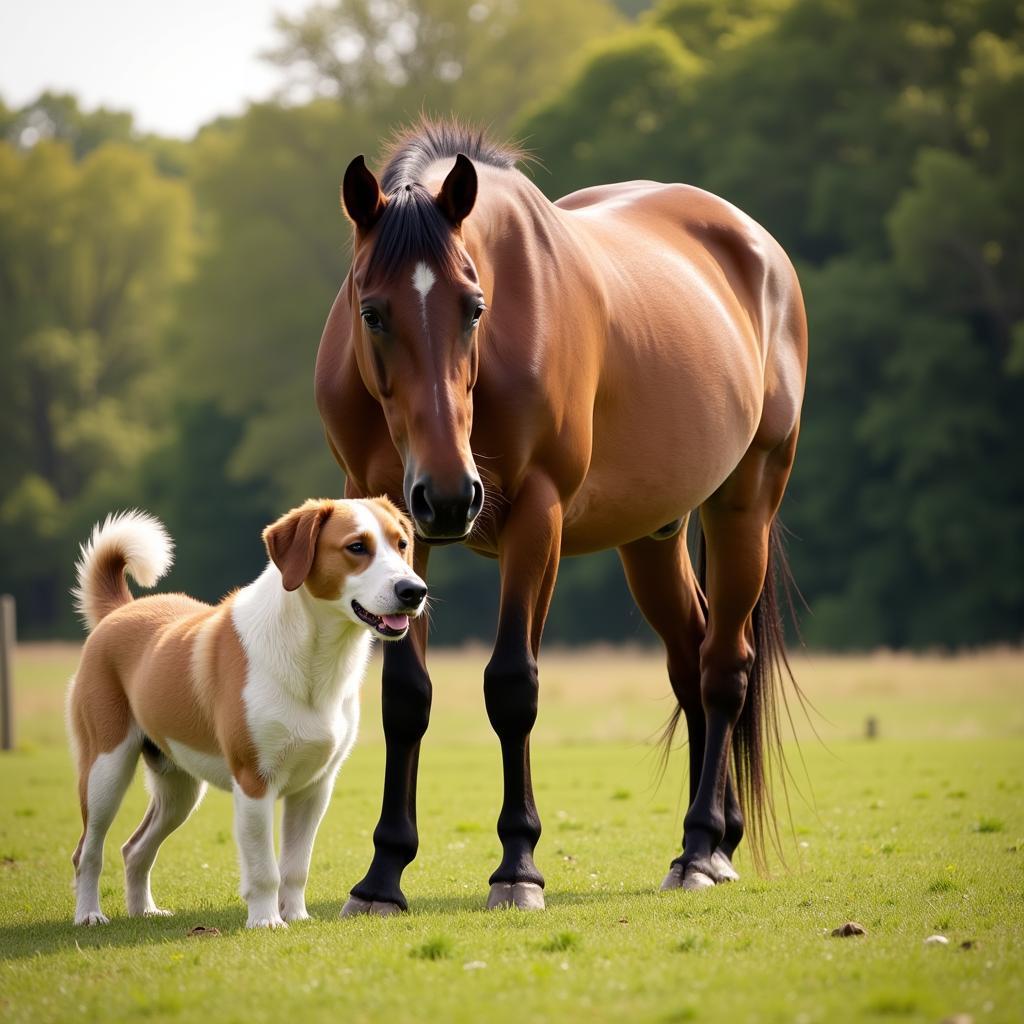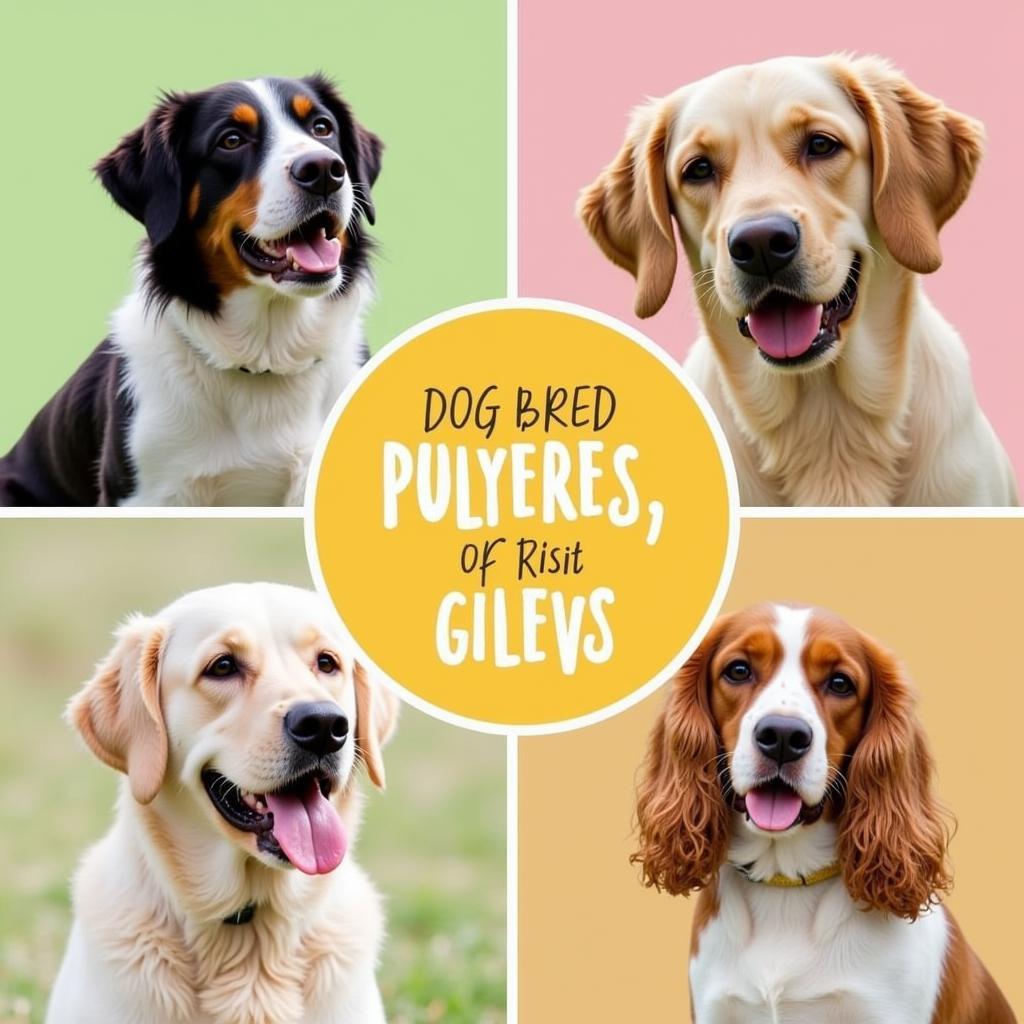Are you considering expanding your furry family with both horses and dogs? The idea of these beloved animals coexisting peacefully is a beautiful one, and with careful planning and understanding, it’s entirely possible. This comprehensive guide dives deep into Horse Dog Compatibility, offering insights and practical tips to create a safe and happy environment for all.
 A horse and dog peacefully interacting in a field
A horse and dog peacefully interacting in a field
Understanding the Dynamics: Horses and Dogs
While horses and dogs can become the best of friends, it’s crucial to acknowledge their inherent differences. Horses, as prey animals, are instinctively wary of predators. Dogs, even domesticated ones, retain some predatory instincts that can unintentionally trigger a horse’s flight response.
Understanding these fundamental differences is key to successful introductions and fostering a harmonious relationship.
Choosing the Right Dog Breed
Not all dog breeds are well-suited to living with horses. Some breeds have a stronger prey drive than others, making them less suitable for equine companions. Here’s what to consider:
Ideal Breeds:
- Herding breeds: Bred to work with livestock, breeds like Border Collies, Australian Shepherds, and Corgis can excel in a horse-friendly environment with proper training and socialization.
- Companion breeds: Known for their gentle and adaptable nature, Cavalier King Charles Spaniels, Golden Retrievers, and Labrador Retrievers can be wonderful companions for both horses and their owners.
- Non-sporting breeds: Poodles, Bichon Frises, and Boston Terriers are generally known for their lower prey drive and adaptable personalities.
Breeds to Avoid:
- Terriers: Many terriers were bred for vermin hunting and possess a strong prey drive that might be difficult to manage around horses.
- Hounds: Sighthounds like Greyhounds and Whippets, while generally gentle, have a strong instinct to chase that can be triggered by a running horse.
- Guardian breeds: While breeds like Great Pyrenees and Akbash Dogs excel at livestock protection, their size and protective instincts can be overwhelming for horses.
 Dog breeds that are generally suitable for living with horses
Dog breeds that are generally suitable for living with horses
Safe and Successful Introductions
First impressions matter. A positive initial interaction between your horse and dog can set the foundation for a lasting bond.
- Controlled Environment: Choose a neutral, enclosed area where both animals feel safe and secure.
- Gradual Approach: Allow your horse and dog to observe each other from a distance before any direct interaction.
- Calm Demeanor: Remain relaxed and assertive. Your animals will pick up on your energy.
- Positive Reinforcement: Reward both your horse and dog for calm, respectful behavior.
Daily Life: Establishing Boundaries and Routines
Living in harmony requires clear boundaries and consistent routines.
- Designated Spaces: Create separate spaces for your horse and dog to eat, sleep, and relax.
- Leash Training: Always keep your dog on a leash when around your horse, especially during initial interactions.
- Supervised Interactions: Never leave your horse and dog unsupervised until you are confident in their bond.
- Consistent Training: Reinforce basic obedience commands with both animals to maintain control and safety.
Recognizing Signs of Stress
Both horses and dogs communicate through body language.
Horse Stress Signals:
- Pinned ears
- Wide eyes
- Rapid breathing
- Tail swishing
- Pawing the ground
Dog Stress Signals:
- Whale eye (showing the whites of their eyes)
- Tucked tail
- Yawning or lip licking
- Raised hackles
If you observe any of these signs, separate the animals immediately and consult a qualified trainer or behaviorist for guidance.
Building a Lasting Bond: Tips for Success
Creating a harmonious multi-species household requires patience, consistency, and a deep understanding of both horses and dogs. Remember these key takeaways:
- Choose the right dog breed carefully.
- Prioritize slow and controlled introductions.
- Establish clear boundaries and routines.
- Learn to interpret your animals’ body language.
- Seek professional help when needed.
By following these guidelines and investing time in training and socialization, you can foster a loving and safe environment for your horses and dogs to thrive together.
FAQs
Can any dog breed live with horses?
While some breeds are naturally more suited, any breed can potentially coexist with horses with proper training, socialization, and management.
How long does it take for a horse and dog to get used to each other?
Every animal is different. Some may bond quickly, while others might take weeks or even months to adjust.
What should I do if my dog chases my horse?
Immediately interrupt the behavior with a firm “No!” and redirect your dog’s attention. Seek professional help from a dog trainer experienced in working with horses.
Is it safe to ride my horse with my dog?
This depends on the individual animals and their training. Always prioritize safety and consult a professional trainer for guidance.
Need More Help?
Have questions or need personalized advice on horse and dog compatibility? Contact Justus Horses USA at 0772127271, [email protected] or visit us at QGM2+WX2, Vị Trung, Vị Thuỷ, Hậu Giang, Việt Nam. Our team of experts is available 24/7 to assist you in creating a harmonious home for your beloved animals.